SUMMARY
This is AI generated summarization, which may have errors. For context, always refer to the full article.
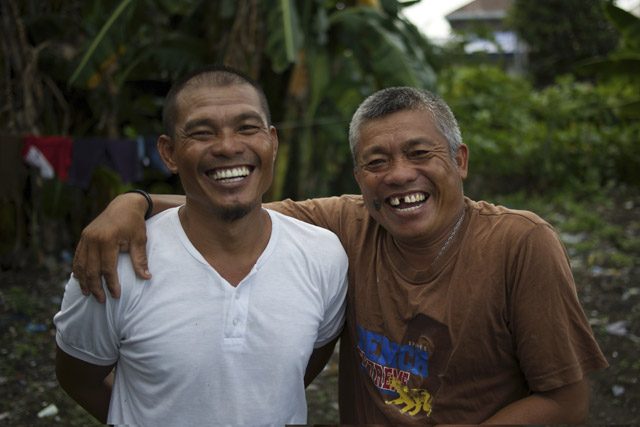
This compilation was migrated from our archives
Visit the archived version to read the full article.

Photography by Carlo Gabuco Design by ANALETTE ABESAMIS
Almost fifty years ago, a travelling salesman from Tacloban named Edgardo Almazan named his firstborn son Edgardo Junior.
There was nothing extraordinary about the birth, or the name, or the boy, until another son came along three years later.
Edgardo Senior decided to name the baby Edgardo – Edgardo II.
Three Edgardos in one small house was confusing– particularly since Edgardo II suspected he should have been named Edgardo III.
One day, a schoolmate shouted “Almazan!” as they walked down the street.
Three heads turned.
“Edgardo!”
All the Edgardos laughed.
And so Edgardo Jr. was nicknamed Jojo, and Edgardo II, the younger, grew up Totoy.

Totoy moved away in his twenties and set off for Cebu City. He applied for a job as a security guard, got a girl pregnant, and happily gave in when she demanded a ring. In 1999, Totoy waited outside their bedroom while his wife screamed through her first birth.
When the midwife announced that it was a boy, Totoy took one look at the squalling infant and decided that the only right and proper name would be Edgardo.
Jocelyn, made of sterner stuff than her mother-in-law, put a sweaty foot down and refused. There would be no more Juniors or Edgardos or Seconds in her family. The boy would be his own man, and he would have his own name.
He was named R-Jay – the R from Edgardo, the Jay from Jocelyn. Three more children followed, one after another, each celebrated by a gleeful Totoy.

Jojo, left behind in Tacloban, had no intention of abandoning the only home he knew. He left high school before graduation and married a seamstress named Anacita, who gave birth to four before she died of colon cancer when the children were very young.
Jojo kept on, selling fish in the day and moonlighting as a watchman at night. He roamed the small coastal village of San Jose with his nightstick, breaking up drunken fights and keeping the peace.
He was sitting at the village hall one day, already ten years a widower with his children grown, when a woman walked in with a sick infant. She had lost her husband recently, she said.
Jojo shared a plate of noodles, and promptly fell in love.
The widow was named Gemma, and she had four children. The youngest, Cristal Faith, was only two months old. The fact did not dissuade the love-struck Jojo, neither did the laughter of his drinking buddies who told him he would be back to carting children to the first grade. Gemma’s children would be his children.
So Jojo went to work, and wooed the widow Gemma.
One day, he took her hand and looked into her eyes.
She smiled.
They were married by a judge, all Edgardos in attendance.

When Totoy’s eldest R-Jay was half grown, he moved his family back to the coastline of Tacloban, where Edgardo Senior itched to have his boys about him.
It was a good life. Totoy and Jojo both made a living peddling fish across the city. The sea was generous, the land rent-free, and the fourth Edgardo – as Totoy insisted his son R-Jay was named – was the same laughing, easygoing image of all the Edgardos before him. Totoy lived with Jocelyn and his four children in Payapay, Jojo with Gemma’s four and two of his grown children in a hamlet called Mamsa.
And so it was that the three Edgardo men and their children and their children’s children lived again side-by-side along the friendly coast of Village 89, San Jose, population 4,300.
It was there, in 2013, on the same friendly coast, that the family chose to ride out a storm named Yolanda.

The Almazans had survived wind and storm before, and had no reason to leave home. Clothes had been folded and packed into sacks for safekeeping. Appliances were wrapped in cellophane. The family – Jojo’s parents, his sister Edith, her four children, Gemma’s own four – packed into Jojo’s living room.
Totoy, a short walk away in his house, battened the hatches and tucked his own children into bed.
The wind began raging in the early dawn of November 8, 2013. Everyone moved into the big concrete bathroom, the safest place in the house.
There was a surge of water. The walls broke. The waves punched through the roof.
Jojo held on to his baby underwater. Cristal Faith, at two years old, clung to the only father she knew.
Jojo swam his way up in the dark. He could hear children screaming over the wind. The water was thick with debris, rising higher than the tops of the coconut trees. He tumbled and struggled and fought. A piece of wood slammed into the back of his head.
He fainted.
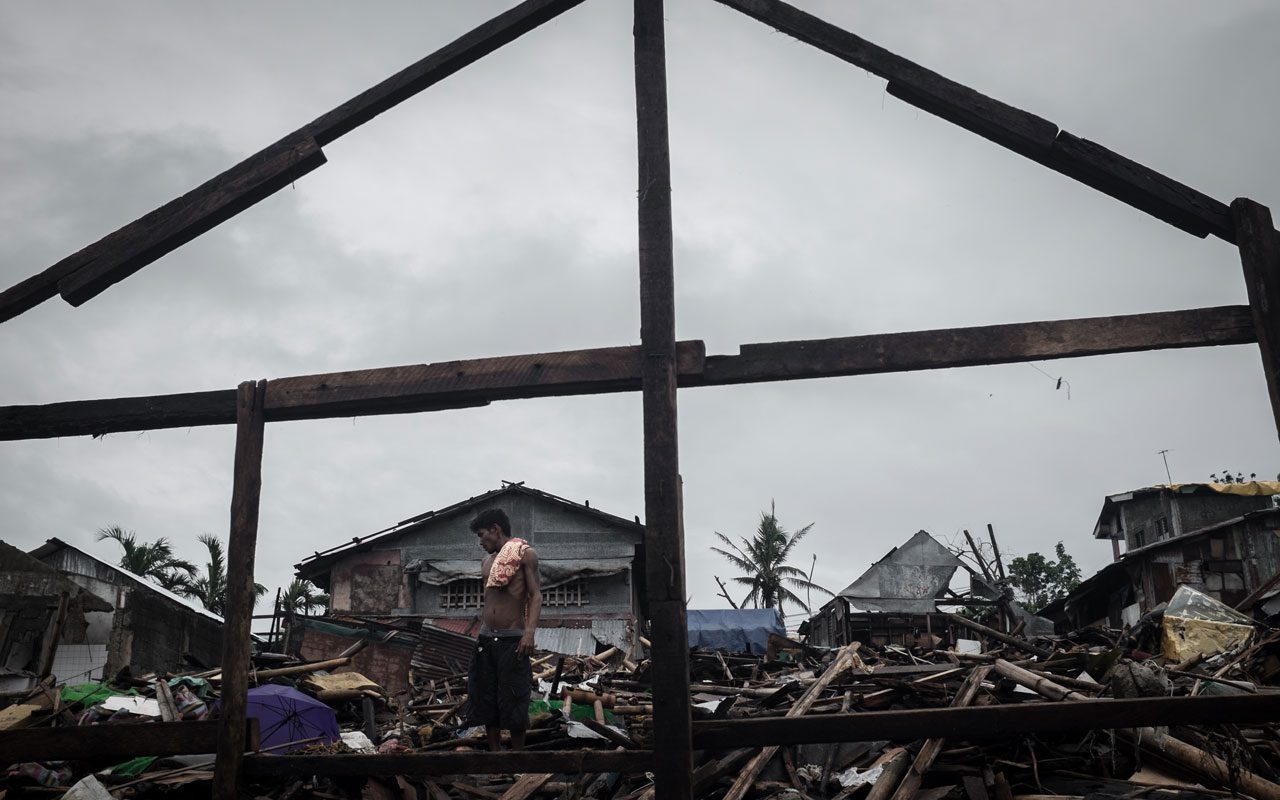
Jojo’s arms were empty when he woke. He twisted in the water, dove into the muck again and again, couldn’t find Faith in the sheets of roofing that slammed against his legs. He found two of the younger children clinging to a piece of wood. He swam to them, kept them steady, and held on for dear life as the water rolled over them.
It went on for half an hour.
When the water disappeared, it left behind the dead. Chickens, pigs, goats, small children, young men, old women, all sprawled in the tall grass. Jojo found one limping son among the survivors. He found his wife safe on a roof. He found every single one of his children alive, except for the youngest.
They wrapped the small battered body in a mat, and slipped Cristal Faith into her grandmother’s arms. They carried both bodies to the funeral parlor, but there were no funerals, or coffins, or anyone to help.
They left the pair by the side of the road with the hundreds of others, and went on to see to the living.

Jojo found Totoy stumbling near-naked through the city, digging through piles of corpses, his back in shreds.
All four children and his wife were gone.
They searched for the bodies in village after village, Jojo certain his brother had gone mad. Totoy wouldn’t sleep, couldn’t speak, refused to eat. It was only when they found his son Ned bleeding but alive that Totoy broke down and cried.
It took longer to find the body of Edgardo Senior, the elderly man who taught his sons to love the bright city by the sea.

For more than a year the brothers lived in tents side by side.
The canvas ripped, the rats moved in, the water dripped into salvaged bedding. At noon, the sun beat down on the mold-mottled roof, turning the inside into an oven, forcing children out into the grass.
This was Tacloban in the grim aftermath of Haiyan, where every narrative rule broke under the strain of dead bodies hanging from the rafters of an elementary school.
They would talk, Jojo and Totoy. About how high the waters rose. About Cristal Faith, and how she slipped out of nerveless hands. About R-Jay, always R-Jay, Totoy’s Junior, his eldest boy, who in the end told his father to let go of him in the water because Ned couldn’t swim and R-Jay could.
Ned lived. R-Jay disappeared.

Totoy waited for his family. He learned to cook. He rubbed coins shiny for his youngest girl. He asked anyone who came by to send word to his family, to tell them he was waiting, that he was sorry he couldn’t save them.
For two Christmases he set out R-Jay’s favorite spaghetti, and sat for hours waiting by the tent flap.
(READ: Edgardo’s Junior)
More than 7,350 people were lost after Super Typhoon Yolanda (international name Haiyan) struck the Philippines on November 8, 2013, with the strongest winds ever recorded on land. At least 520 people from Village 89 were killed.
Totoy does not count his eldest among them.
Two years after Yolanda, the brothers still live in Tacloban. The tents are gone, although scraps have been used to fill in the gaps between the walls in shanties across the coastal hamlets. A Save the Children tarp covers a window here, UNHCR canvas carpets a floor there. Along the highway Piolo Pascual hawks Natasha fashion, and rice and tinned sardines are sold under store signs advertising rum and USAid.
This is Tacloban the risen, Tacloban the proud, Tacloban recovered, with the national government crowing over its success. The boats stranded on the city hall lawn have been towed away. The flagpole stands tall again, thirty feet of steel spearing into the sky, flag rippling in the wind. (READ: Painfully slow rebuild after Typhoon Yolanda)
In the aftermath of Yolanda, the government of President Benigno Aquino III launched a P150 billion ($3.2 billion) reconstruction program for the disaster zones. Two years later, the city’s bunkhouses, muggy in the white noon, are still occupied, barefoot toddlers slipping in the muck in spite of a promise by Department of Social Welfare and Development Secretary Dinky Soliman that no bunkhouses will remain in Tacloban by the second year anniversary.
At least one child has died under the suffocating conditions.
As of November 8, 2015, only 1,128 permanent houses were completed, less than 10% of the targeted of 16,331 living in no-build zones. Records from the Tacloban City Housing Office show around 2,000 families are still living in bunkhouses and transitional shelters.

The Almazans’ new houses are square and unpainted, standing on stilts a foot from the ground on property titled to a local homeowner. Jojo and Totoy constructed their homes a little more than a year after Yolanda, with conditional cash grants from Oxfam and Green Mindanao.
Inside Totoy’s house there is a closet, a green plastic chair, a desk for Ned and a blackened pot that Totoy uses to boil rice. Laundry hangs in a line under the trees.
On September 2015, the Almazans received P 30,000 (638 USD) in Emergency Shelter Assistance (ESA) long after congress had signed off on the budget, almost two years after the typhoon.
On a good day, each brother will make P200 (about $5) selling fish – barely enough to keep the children in school.
Jojo spends much of his time scratching his head. It is impossible, he says, but you do what you can.

Up in the north, new houses are laid out with suburban precision, but Jojo and Totoy will not leave Village 89. They were summoned to the village hall with a notice to vacate from the landowners. The Almazans now have six months left to move out, but they will not sign up for permanent housing.
Look at Editha, they say. Editha, their middle sister, a single mother with four children, who unlike her brothers, filed papers for a permanent home under Operation Blessing – a resettlement project funded by private donors.
Editha discovered there would be monthly payments after five years of residency. At several hundred a month, it is still more than she can afford. The house is too far for daily travel, too expensive without access to work or cheap food.
Editha has since waived her claim, and returned to Village 89 to live beside her brothers.
Eleven families from Village 89 moved into the new houses. Only 8 stayed on.

Totoy is resigned to his wife’s death. He lives alone in his house with Ned, now tall and gangly at 11 years old.
Totoy is willing to believe his wife and daughters are gone. He misses them, but a man must move on.
It is R-Jay that he is waiting for. His boy, he is certain, is still alive. Maybe there is only half a chance, but R-Jay had always been a strong swimmer. Totoy is long past asking R-Jay to come home. He believes instead that R-Jay is waiting, someplace faraway, wondering when Papa will come to find him.
Jojo has given up on telling his brother that R-Jay is dead. Let Totoy find his comfort where he can, he says.
Jojo believes in second chances. He lost his wife, and fell in love again. He lost his home, and built another from the ruins. He has one son graduating from college, a young man whose education Jojo saves for by dropping coins into a broken bamboo shoot by the family toilet.
It may be that Jojo will lose his home again, he says, but he has his family, and he has Tacloban, where his father is, where his mother lies, where he lost the adopted daughter who was in her mother’s arms on the day he fell in love.
He hopes, one day, that his brother will find love too.

Almost fifty years ago, a travelling salesman from Tacloban named Edgardo Almazan named his two sons Edgardo.
Edgardo Jr. and Edgardo II had their own children, and they lived and loved and laughed in the city by the sea, until the day a storm came.
Two years later, Jojo Almazan, Edgardo Jr., struts down the narrow alleyway between his house and his brother’s. His eyes are bright, his chin cocked, he is shirtless and sweaty and grinning with the look of a man itching to show off.
An infant girl is tucked into the curve of his arm.
Her name is Edelyn Mae. In the grand tradition of the Almazan men, she is named for her father, who is announcing to all who will listen that he made her in the heat of a canvas tent.
She is a burbling, happy child, only seven months old, the littlest and most fearless of the Edgardos, granddaughter of a man who taught his sons to laugh, and love the city by the sea. – Rappler.com

Add a comment
How does this make you feel?
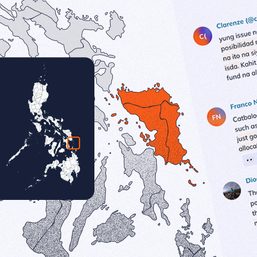
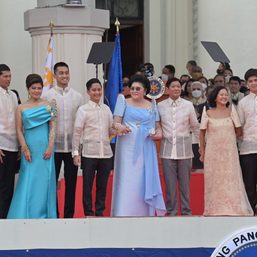

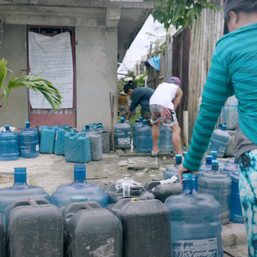
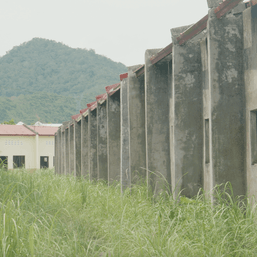
There are no comments yet. Add your comment to start the conversation.